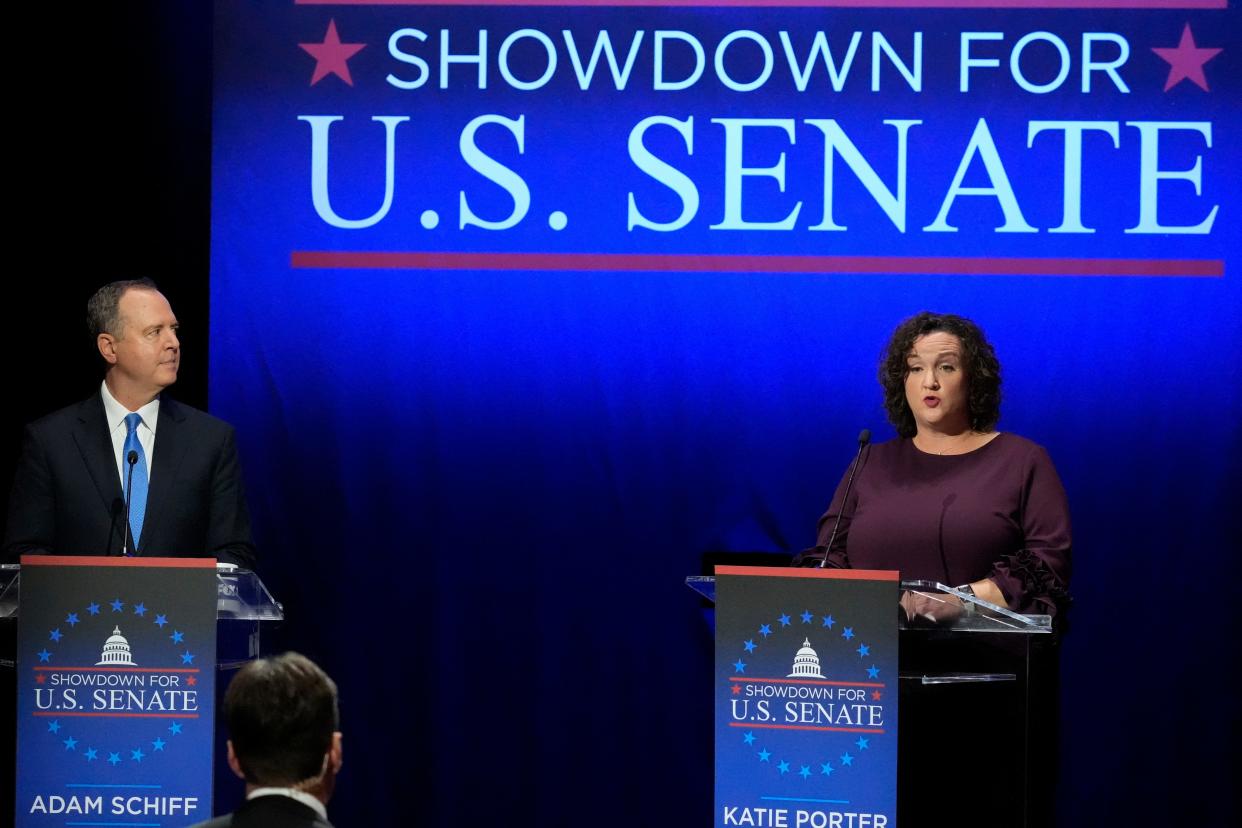California presidential primary election 2024: What to expect on your Super Tuesday ballot

Ballots for California's presidential primary are now hitting mailboxes, launching early voting in a state with a massive delegate count that could play a major role in determining who will clinch the presidential nomination for the Republican Party, and help decide who will be in the majority in the U.S. House of Representatives next year.
This will be the second Super Tuesday for California following a 2020 rule change giving voters in the most populous state greater influence over primaries after years of late-June elections when presidential nominations were often already secured.
Though the state's March 5 primary may seem far in the future, millions of registered voters will be faced with nearly two dozen candidates from six political parties running to be president of the United States.
Unlike the November General Election, all primary ballots are not made equal, and may differ significantly depending on the voter's party registration. For some, it could mean not seeing any names for the presidential primary race.
To check your registration status, visit registertovote.ca.gov.
What to expect on your California ballot: Presidential primary election
California holds a "modified" closed primary for presidential elections, meaning registered voters can only cast votes for candidates of their own political party, unless they request to vote differently via a specially requested ballot. The exception is the Republican Party, which only allows registered Republicans to vote for GOP candidates in primaries.
If you're a registered Democrat:
You can vote only for Democrats, and will have the option of voting for the party's nominee among eight certified candidates, including incumbent President Joe Biden.
You cannot vote for Republican Party candidates, as the GOP holds "closed" primaries, allowing only registered Republicans to vote for Republican candidates. In order to vote for a Republican, voters must re-register with the Republican Party. The same goes for those wishing to vote for the Green and Peace and Freedom parties. Registered Democrats wanting to vote for an American Independent or Libertarian candidate must either re-register with the party or register with No Party Preference.
If you're a registered Republican:
You can vote only for a Republican candidate. Eight people qualified to be on the ballot back in December, including some who have since suspended their campaigns, including Florida Gov. Ron DeSantis, Vivek Ramaswamy and former New Jersey Gov. Chris Christie. Top candidates still in the running are former President Donald Trump and former United Nations Ambassador Nikki Haley.
If you want to vote for a candidate from the Green or Peace and Freedom parties, you must re-register with that party. If you want to vote for a Democrat, Independent or Libertarian presidential candidate as a Republican, you can either re-register with the party or register as No Party Preference.
If you're registered Independent:
As a member of the American Independent Party, you may vote for this year's sole Independent candidate, James Bradley. Independents are often mistaken for candidates without a party affiliation. Those who are not members of any political party are called No Party Preference, not Independent voters, as that refers to the American Independent Party.
If you are registered as an Independent and want to vote for a Republican, a member of the Green Party or a Peace and Freedom candidate, you must re-register with that specific party.
If you want to vote for the Democratic or Libertarian parties' presidential candidates, you can either re-register with the party or register with No Party Preference.
If you're registered as No Party Preference:
You will not see any presidential candidates on your ballot unless you request a "cross-over" ballot.
Three political parties allow No Party Preference voters to "cross over": the Democratic Party, the American Independent Party and the Libertarian Party. The Green Party, Peace and Freedom Party, and Republican Party do not allow unaffiliated voters to "cross over," which means unaffiliated voters wishing to cast their ballot for a Republican must re-register with the GOP.
If you're registered with another party:
The roughly 7% of Californians registered with minor political parties, such as the Green, Libertarian and Peace and Freedom parties, may only vote for their party's candidate, unless they re-register.
Though there is ample time to mark up your ballots before the primary—up to a month—elections officials often suggest not leaving it to the last minute. Ballots are first mailed out Feb. 5, and by Feb. 6, all counties are required to have opened a ballot drop-off center accepting vote-by-mail ballots. Early voting sites and ballot drop-off locations will be listed on the California Secretary of State's website, caearlyvoting.sos.ca.gov/.
If you are registering or re-registering less than 15 days before an election—Feb. 20 or later— you will need to complete same-day voter registration, and must request your ballot in person at your county elections office or polling location.
California primary elections: Add these important dates to your 2024 calendar
What to expect on your California ballot: U.S. Senate primary election
In addition to the presidential primary race, all registered Californians also will vote for a candidate for U.S. Senate. Luckily, there isn't much to worry about when it comes to party registration, as the state uses a top-two system, allowing voters to throw their support behind any candidate regardless of party, leaving the top two vote-getters to advance to the general election.
But there will be two U.S. Senate contests on the primary ballot. The first is for a regular six-year term ending in 2031, attracting over two dozen candidates. The second is for the remainder of the late-Sen. Dianne Feinstein's term ending Jan. 3, 2025, featuring just seven candidates including front-runners Steve Garvey and Reps. Adam Schiff, Barbara Lee and Katie Porter.
Kathryn Palmer is the California 2024 Elections Fellow for USA TODAY. Reach her at kapalmer@gannett.com and follow her on X @KathrynPlmr.
This article originally appeared on Palm Springs Desert Sun: California primary election 2024: What will be on my ballot?

